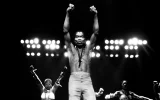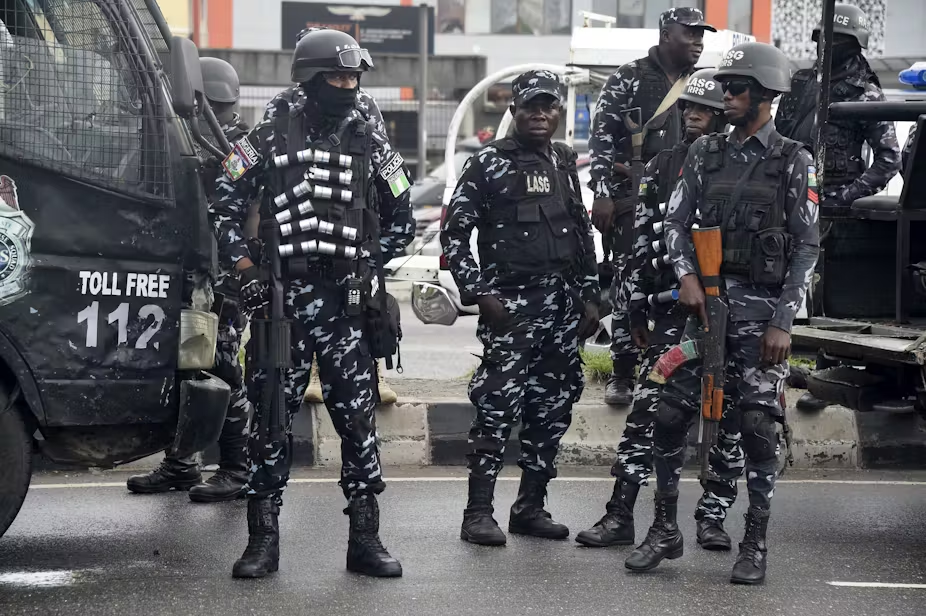Aroused and angry,
I thought to beat the alarum, and urge relentless war;
But soon my fingers fail’d me, my face droop’d, and I resign’d myself,
To sit by the wounded and soothe them, or silently watch the dead.
Walt Whitman (1819–1892), Leaves of Grass.
The Nigerian society is ruled by a strict definition of masculinity and the roles of both genders (male and female) are clearly outlined. Ascribed roles for each gender are in no way expected to interpolate. Men (and boys) are expected to be strong, solid and nothing less.
Gilia Banks in an article entitled ‘Masculinity in Nigeria: Rebellion vs. Conformity and Power’, posits that:
“Masculinity is the only way of living for both the young and old men of Nigeria. Fathers drill it into their sons and society will reinforce these guidelines to further instill them into every little boy’s way of living. It starts young and they receive training to be the best, as they get older.”
In lieu of this, it becomes a huge problem- how to define, discuss and even acknowledge the issue of male sexual assault in a society where masculinity is so valued, strongly defined and controlled.
Rape, regardless of gender and sexuality, is an issue nobody wants to talk about; hence it is highly under-reported globally. Despite the fact that Nigeria is largely a parochial society, it is worthy to note that sexual crimes against men occur in the country– even though it is not as common as female rape.
Society is increasingly aware and empathetic towards female rape victims, many, however, fail to believe –not to talk of sympathize- that men can actually be sexually assaulted. Victims of male rape have overtime remained unknown, invisible and their stories untold. They die in silence, with no one knowing the cause of their anguish.
Male victims of rape are plagued with the same feelings as female victims, such as anxiety, post traumatic stress disorder (PTSD), paranoia, withdrawal, depression, loss of sleep, self-loathe, shame and flashbacks.
Due to the trauma, many victims of male sexual abuse go on to become abusers themselves- and they don’t discriminate on the gender of their victims.
It is a case of double whammy for male rape victims as they are left with a feeling that they have been ‘de-maned’ (to feel less than a man).
In a society where masculinity is, more or less, equated with power, respect and dominance, the feeling of being less of a man can seriously affect the functions of a male in all aspects of life- sociologically, biologically, psychologically and even, physically.
The Nigerian criminal law (both the criminal code applied in the South and the penal code used in the North) define rape as an act that must involve a woman or girl only. Hence, it is safe to say that in Nigeria, a man cannot be raped or even be sexually assaulted. What hope then does the victims of male rape have in getting justice or even succour?
In an email exchange with YNaija, Rashidi William, the Founder and Director of Queer Alliance, explains the mindset of male rape victims.
“The stigma that is attached to being a victim of rape ensures that rape victims remain silent about their experiences. It only takes courage and resilience to come forth and speak out about being raped as a man.”
“Male rape happens. It might be rare but we cannot rule out the fact that a man can be raped. And rape must be not viewed as penetrative. An act that involves the sexual parts of the body without the consent is what constitute rape.”
“It is a mockery of one’s maleness when a man is raped regardless of who rapes the man. We can count a whole number of reasons as to why male rape victims refuse to speak out. The main conundrum is the loss of power or one’s masculine identity. So when this happens, victims think the best thing to do is to keep silent which on the other hand has more implications in comparison to the so called loss of power or masculine identity.”
Although there are cases where a woman rapes a man, majority, however, are situations where a man rapes another man.

To find out more about the issue of male rape, YNaija reached out to a Medical Doctor, John Wigwe (name changed over privacy concerns), a physician with a non-profit health organization in Lagos, who has dealt with several victims of male rape.
Meeting him in his green walled office that was bordered on one side with an opaque glass, a small window and single white bulb serving as the source of light, Dr. Wigwe appeared to be uncomfortable as we began the discussion on the “sensitive issue” of male rape.
He, however, eased up as the conversation progressed, especially after being effusively assured that neither his identity nor that of his patients will be made public.
“Rape generally is a taboo and no one likes to talk about it,” Wigwe said.
He recounted the story of a patient who was anally raped by seven men –one of whom was a uniformed police officer with a gun- who allegedly punished him for being gay.
Wigwe said the victim met one of his would be abusers on a dating app and arranged a rendezvous with him at a hotel in Lagos. The victim was however, ambushed by seven men who took the cash he had on him, his ATM card and other valuables before raping him.
“The men who raped this guy said they were trying to cure him of his homosexuality by having homosexual intercourse with him. It proves that they themselves are gay”, the doctor added.
In 2012, former Nigerian President, Goodluck Jonathan, assented to an anti-gay bill that criminalized all forms of public homosexual union. Ever since then, there has been an upsurge in attacks on individuals perceived to be homosexual or caught in any homosexual act.
It is also not surprising that instances of corrective rape (where perpetrators try to correct the sexuality of an individual by having forceful intercourse with them, and ultimately shaming them into a heterosexual lifestyle) will occur in Nigeria, given the disdain a large percentage of citizens have for people who do not conform to supposedly acceptable gender and sexuality rules.
Wigwe further revealed that he counselled his victims not to report to law enforcement officials or talk to anyone about their ordeal to avoid further exposure to victimization.
He said his patient who got raped by 7 men “was cool, calm, confident –but you get the feeling that something else is going on. It’s not surprising because people like that are not allowed to break down because if they do, where do they go to? Or how will they explain what happened? The fact that it was seven people –seven full grown men- going in and out of his body, how do you explain that?”
“Then there’s the stigma- that he wasn’t walking on the street when this happened, but he went to meet the people who ended up raping him.”
Silent sufferers
The medical practitioner said that in all his years of practice, he has only met and treated two victims of male rape- both cases were homosexual rape.
He agreed that there would be several other victims who are yet to disclose their ordeal to anyone and are suffering in silence- carrying a heavy, yet unseen, burden.
The two he treated were lucky, Wigwe said.
They knew people and places where they could get medical attention from. “What happens to a rape victim in a rural area?” he queried.
There are no statistics nor records, whatsoever, to rely on when making a case on the number of male rape victims in Nigeria. In fact, there is no research work to support the case that such a supposed misnomer, as male rape, actually exists in the Nigerian society.
Moreover, it is a difficult pill for society to swallow that the man, said to be ‘pillar of the society’ (ide ji uno, as the Igbos of southeast Nigeria would say) can be a victim of sexual crime.
Legally, victims of male rape have no succor or hope for justice as there is no provision and recognition that male rape can occur.
The Nigerian criminal code used in southern Nigeria defines rape as:
“Having unlawful carnal knowledge of a woman or girl, without her consent, or if the consent is obtained by force or by means of threats or intimidation of any kind, or by fear of harm, or by means of false act, or, in case of a married woman, be personating her husband.
This offence is punishable by imprisonment for life, with or without caning.”
While the penal code obtainable in northern states defines it as:
“Having sexual intercourse with a woman in any of the following circumstances:- (a) against her will; (b) without her consent; (c) with her consent, when her consent has been obtained by putting her in fear of death or of hurt; (d) with her consent, when the man knows that he is not her husband and that her consent is given because she believes that he is the man to whom she is or believes herself to be lawfully married; (e) with or without her consent when she is under fourteen years of age or of unsound mind.”
Buttressing on the stigma that surrounds male rape, Rashidi Williams further stated that: “The reasons why there are no statistics on male rape in Nigeria can be linked to the issues of power and patriarchy. First, you cannot claim to be raped as a man because rape is viewed as a forceful penetration of the body orifices. So to claim that you have been a victim of rape as man means that you have been penetrated and this is not supposed to be. The stigma that surrounds the issue of rape as a general phenomenon further complicates a man reporting that he has been raped.”
“I cannot say how often male rape occurs in the Nigerian society because there are no statistics to back this up and as a society, this is an issue we shy away from. There is no significant body of research that explicates on the issue of male rape.”

What can be done
To begin with, it takes a nation to recognize that there are victims of male rape as well as female rape (Gender Equality?) –before anything can be done.
After it is recognized, the government and the Nigerian society should then provide the necessary structure and an anonymous helpline to encourage boys and men who get defiled, to speak out without fear of victimization and societal ocstracisation.
Majority of discussions and researches on sex related crimes have mostly dwelled on the concept of female rape, resulting in what a scholar described as the “feminization of victimization.”
At the moment, there’s no visible apparatus in place and the scourge still ensues, hence, temporary solution can come from private individuals and non-governmental organizations, who can help set up facilities to provide medical and psychological treatments for male victims of sex crimes so they don’t become future abusers and so that the cycle of abuse won’t persist perpetually.














